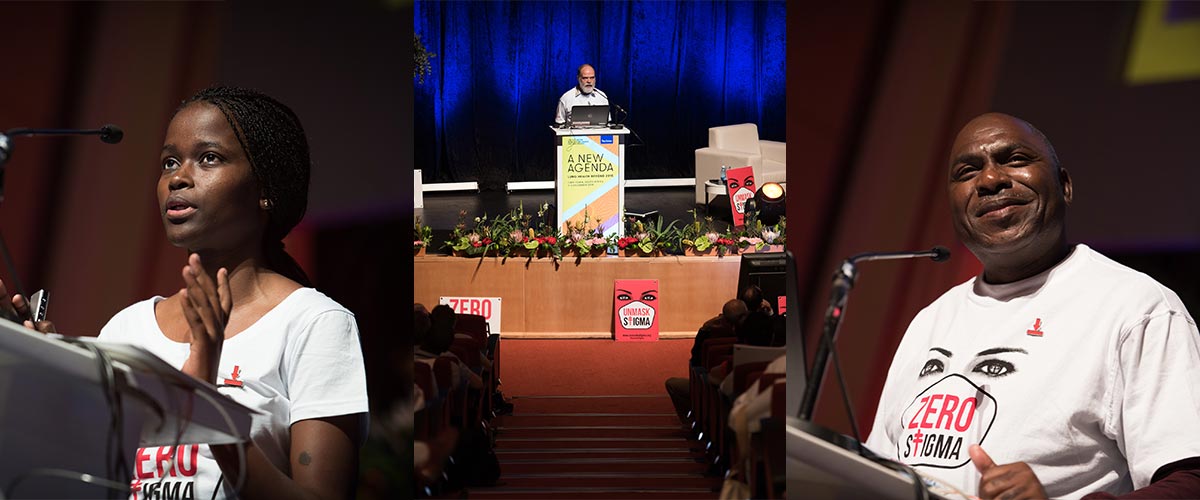
Challenges to the eradication of TB: Plenary II
Plenary session II on Saturday brought together three speakers presenting perspectives on different challenges to achieving the eradication of tuberculosis. Topics ranged from the availability and affordability of treatments and the stigma around TB, to zoonotic tuberculosis and the risks that poses not only to rural communities but also to the general population, to the need for more community involvement from researchers working in TB, as well as other diseases affecting poor and hard-to-each groups.
Defeating XDR-TB, disability and stigma: an ordinary call for extraordinary measures
Phumeza Tisile, an XDR-TB survivor and activist, opened the session by sharing her personal story of treatment, which left her completely deaf and caused a growth in her lungs requiring a surgery that resulted in broken ribs and a collapsed lung.
Calling for more accessible and affordable treatments in South Africa and around the world and the end to stigma, Phumeza asked the audience to join her in breaking down the stigma of TB by putting on the white masks that had been handed out at the entrance to the auditorium. This type of activity is part of the Unmask Stigma campaign run by TB Proof, a South African NGO that Phumeza works with. “Behind the masks we are all the same”, she said.
Phumeza was cured of XDR-TB following several misdiagnoses and three years and three months of treatment. She was able to recover her hearing through cochlear implant surgery made possible through a crowd-funded effort that raised $20,000 – a surgery that most of those who are most affected by TB cannot afford, she pointed out. She also highlighted the need for more affordable drugs and laws to lift patents on TB medicines in South Africa and around the world.
Drug-resistance and the contribution of zoonotic TB
The second speaker, Prof Paul van Helden, highlighted a very different challenge to ending TB in his discussion of zoonotic tuberculosis and drug resistance. Zoonotic tuberculosis can be passed from animals to humans and requires the attention of physicians and the development of new drugs and different treatment regimens.
Conservative estimates based on the available evidence shows that 1.4% of all TB cases are caused by zoonotic strains. This amounts to approximately 126,000 people worldwide annually – or over 1 million cases in the last decade. Mycobacterium bovis, a zoonotic strain of TB, is naturally resistant to one of the key first-line medicines used in the standard TB treatment regimen. This significantly increases the risks of treatment failure and the development of resistance to other TB treatments. Additionally, many clinics do not test for zoonotic strains of TB in humans, causing them to be under-reported and inadequately treated – and greatly increasing the possibility that these patients will develop drug resistance.
“We are not going to stop TB until we stop zoonotic TB”, Prof van Helden said, “Wildlife. Livestock. Humans. We are all in this together and we need to end TB across the board.”
Ubuntu and research involving communities with a high burden of TB
The third plenary speaker to take the stage was Reverend Nicholas Busani Bhengu, a native of KwaZulu-Natal province in South Africa and a member of a community research advisory team for a project on the uptake and effectiveness of isoniazid preventive therapy (IPT) in a region of high TB-HIV co-infection.
Reverend Bhengu spoke about “Ubuntu” – meaning inclusion, or unity of the people. Highlighting the challenge that many researchers face in finding participants for their studies, he called for all those researching tuberculosis, HIV and other diseases that disproportionately affect difficult to reach poor areas to view their research subjects as people and integrate themselves better into the communities they study.
“I want to start a conversation that I hope will continue outside of this room”, said the Reverend who then went on to tell a story about a researcher who regularly visits her community. She is called by an African name and speaks the local language – although outside the community everyone knows her as Jody and she is a native English speaker. She knows the members of the community and she listens to their stories – not just stories of their symptoms and treatment regimens, but about their lives and families. She is accepted by the people and they welcome her and her research.
“She is not here to point out what is wrong. She talks with us, not at us. She doesn’t treat us like subjects to research or poor people to pity. She doesn’t talk down to us but explains TB concepts so that we understand as local people.”
Reverend Bhengu encouraged researchers to be culturally aware and curious if they wish to engage the people they are studying. “If you think that principles of community-based research do not apply to your studies, I would like to encourage you to think again. Without us, you will not have participants in your studies.”
The Union Awards
The session closed with the presentation of two Union awards. The Union Young Investigator prize, which acknowledges a researcher for work in lung health published in the past five years, when age 35 years or younger, was awarded to Dr Jason Andrews, an infectious diseases physician and epidemiologist. His research focuses on understanding transmission dynamics of tuberculosis in high-burden settings, and current projects include examining drivers of tuberculosis in South African townships and Brazilian prisons.
The Union Scientific Prize acknowledges researchers at any stage in their career for work on tuberculosis or lung health published in the past five years. The Scientific Prize was awarded to Dr Helen Cox, an epidemiologist specialising in tuberculosis who has worked in TB and drug-resistant TB since 2001. She was instrumental in the establishment of one of the first drug-resistant TB treatment programmes in Central Asia and since 2008 has been involved in operational research in Khayelitsha, a Cape Town township with a high burden of drug-resistant TB.

